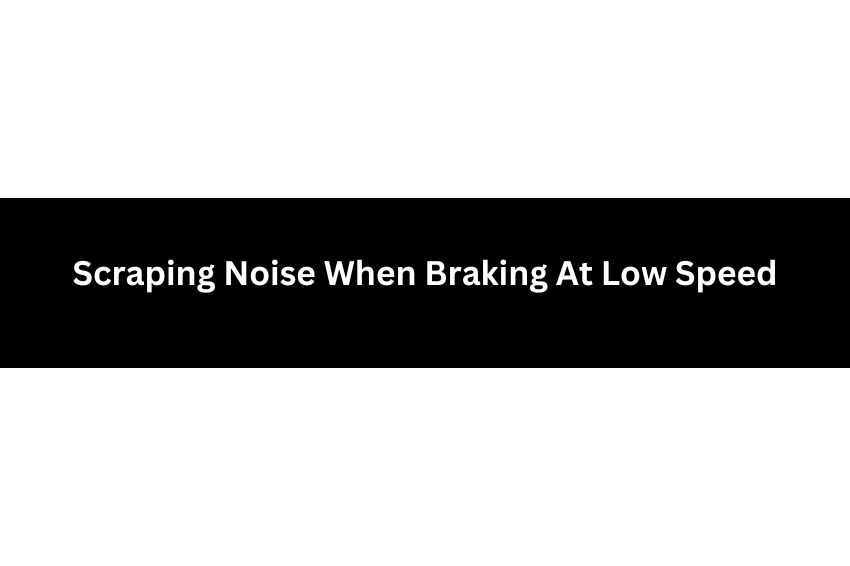Scraping noises when braking at low speeds are often caused by simple issues that you can easily fix.
Let’s walk through the common causes and DIY fixes
What Causes Scraping Noise When Braking At Low Speed?
One of the most common causes of scraping noise when braking at low speed is worn brake pads.
As your brake pads wear down, the metal part of the pad can start rubbing against the brake rotors, causing a scraping or grinding sound.
If you notice this sound more often, check the brake pads.
When they get too thin, it could be time to replace them to avoid damage to other parts of the brake system.
Another possible cause is debris getting stuck in the brakes.
Small stones, dirt, or sand can get lodged between the brake pads and rotors.
When you apply the brakes, the trapped debris can create a scraping noise.
This often happens if you’ve been driving on gravel roads or in dusty conditions.
If you think this may be the issue, it’s best to get the brakes cleaned to remove any particles that might be causing the noise.
Rust on the brake rotors can also be a cause of the scraping sound.
If your car has been sitting for a while, especially after it’s rained or been wet, rust can form on the rotors.
This can lead to a scraping noise when you brake, but it might go away once you’ve driven the car for a bit.
However, if the rust is severe, it can affect the braking performance, and you will need to have the rotors cleaned or replaced.
In some cases, the scraping noise can be caused by glazed brake pads or rotors.
This happens when the brakes get too hot, which can make the surface of the pads or rotors smooth and shiny.
If you’ve been using your brakes heavily or have overheated them, this could be the issue.
In such cases, the noise will go away after the brakes cool down, but it’s always worth checking if the pads need replacing.
If the noise continues or gets worse, it could be a sign of more serious issues with the brake system, such as improper installation or a malfunctioning part.
In these situations, it’s best to have a professional mechanic inspect your brakes to ensure everything is working properly.
How Can I Fix Scraping Noise When Braking At Low Speed?
Here are some DIY fixes for the most common causes of scraping brake noise:
Step 1: Check The Brake Pads
As we’ve said, worn brake pads are one of the most common reasons for scraping noises.
When the brake pads wear down too much, the metal parts can scrape against the rotor, causing that annoying sound.
To check, Jack up the car and remove the wheel.
Look at the brake pads through the caliper to see how much material is left.
If the pads are thinner than 1/4 inch, they need to be replaced.
However, If the pads are worn out, replace them with new ones.
Make sure to install the pads correctly and lubricate the contact points to ensure smooth braking.
Step 2: Look For Debris In The Brake Pads
Sometimes small stones, dirt, or other debris can get trapped between the brake pads and the rotors, causing a scraping noise when you brake.
Inspect the brake pads and rotors for any visible debris.
You might see small rocks or dirt caught in the system.
If you find any debris, carefully remove it with a flat tool or compressed air.
Make sure to clean the entire brake area to prevent more debris from causing further issues.
Step 3: Inspect For Rust On The Rotors
Rust can form on the brake rotors, especially if the car has been sitting in damp conditions for a while.
This can cause scraping noises as the pads rub against the rusted surface.
Look at the brake rotors through the wheel.
If they have a reddish-brown coating, they may be rusty.
And, If the rust is light, you can remove it by lightly sanding the rotors or using a special brake cleaner.
However, if the rust is severe or the rotors are damaged, they may need to be replaced.
Step 4: Check The Brake Calipers
Sometimes, the calipers can stick or become misaligned, which can cause scraping when you brake.
If the calipers aren’t properly centered or are rubbing against the rotor, it will create noise.
Remove the wheel and inspect the brake calipers to see if they are in proper alignment.
They may need to be adjusted or replaced if they appear misaligned or stuck.
To fix, clean the area and lubricate the moving parts.
If it’s misaligned, adjust it so it sits properly on the rotor.
Step 5: Inspect The Brake Fluid
Low or contaminated brake fluid can cause issues with your braking system, which might lead to scraping noises.
Make sure the brake fluid is at the correct level and free of contaminants.
Check the brake fluid reservoir.
If the fluid is low, top it up with the correct type of brake fluid for your car.
Also, If the fluid is dark or dirty, it may need to be flushed and replaced.
And, If the fluid is dirty, it’s a good idea to replace the brake fluid with a mechanic.
Related Post:
Noise When Braking At Low Speed
Noise When Pressing Brake Pedal
Brake Noise: Types Of Brake Noises, And What Do They Mean?
